 Society
Society

By Lê Việt Dũng
Nguyễn Tất Thắng, co-founder of the Social Impact Business (SIB) Gốm Sen Pottery, is not just shaping clay into beautiful ceramics but also moulding brighter futures for disadvantaged people.
Through Gốm Sen Pottery's diverse range of free classes, he provides valuable knowledge and skills to help learners rise above their circumstances and unlock their full potential.
Tất Thắng’s passion for ceramics was kindled from a young age in the thousand-year-old pottery village of Kim Lan, Gia Lâm District, Hà Nội. After graduation, he volunteered for United Nations humanitarian projects focused on education, which deepened his belief in the transformative power of learning. This led him to co-found Gốm Sen Pottery and offer free classes to the disadvantaged in Bát Tràng Village, not far from Kim Lan.
The classes initially attracted only a few participants, as they were not widely known. A turning point came when REACH, a non-profit organisation specialising in vocational training and job placement for disadvantaged youths, partnered with Gốm Sen Pottery to expand its reach. Now, the classes have 35 learners, supported by funding from REACH, Gốm Sen Pottery, and benefactors.
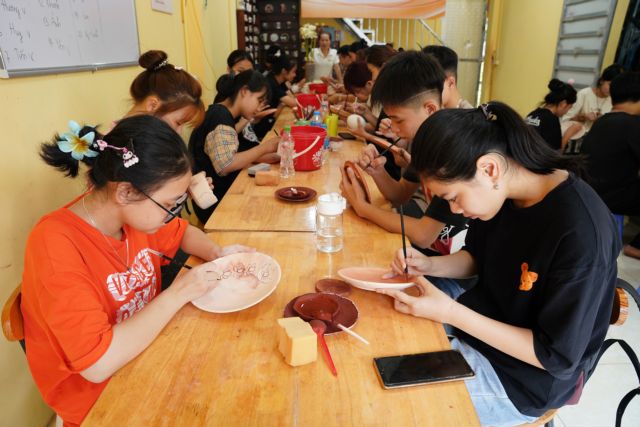 |
| Learners attend a pottery painting class. — Photo courtesy of Gốm Sen Pottery |
The curriculum offers a variety of courses, from pottery-making to English language skills, tailored to each learner's career path. The goal is to empower them to take control of their futures.
"Upon finishing the courses, learners can join Gốm Sen Pottery, become entrepreneurs in the ceramic industry, or pursue other paths," said Tất Thắng. "The decision is theirs to make."
This personalised approach has led to positive changes among the learners. Some with disabilities have overcome self-doubt and shown remarkable improvement. One example is V.T.T.H., a 19-year-old girl with profound hearing and speech impairments. She had faced so much ridicule from her peers that she withdrew from social contact for years. Her parents, overprotective and well-intentioned, shielded her from responsibilities, which only deepened her depression.
When she first joined the classes, V.T.T.H. was uncooperative and often left without permission. She avoided interacting with others, which sometimes caused resentment among older learners. Tất Thắng, understanding her struggles, enrolled her in a pottery painting course, hoping art would heal her emotional wounds. He also encouraged her classmates to be understanding and supportive.
"I told them to be patient with her and encouraged them to greet her first whenever they meet her, just like I do," said Tất Thắng.
His persistence paid off. After five months, V.T.T.H. began attending classes more regularly and greeting everyone with a wave and a smile. Her passion for pottery painting grew, and now she creates beautiful ceramic pieces with intricate patterns that are highly praised by tourists.
"Her confidence gets a huge boost whenever someone compliments her pottery," said Tất Thắng. "It proves to her that she is not worthless as she thought but capable of great things."
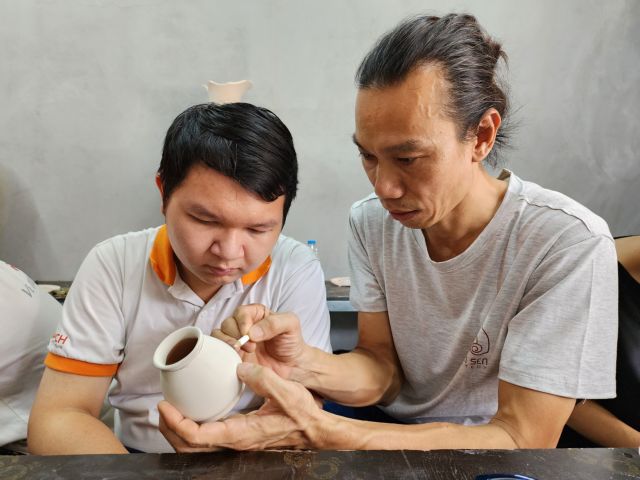 |
| Nguyễn Tất Thắng shows an autistic learner how to paint a pottery jar. — VNS Photo Lê Việt Dũng |
L.U.N., also 19, is another example of how the classes have transformed lives. Born into a family of eight, with parents struggling as farmers, her situation worsened when her mother was diagnosed with cancer. Forced to quit school and work to support her family, she found hope in the classes, where she learned pottery and continued her English studies, a subject she loved but could not afford.
In just a few months, L.U.N. has made incredible progress. She can now hold simple conversations in English with tourists, and her pottery skills are rapidly improving.
"Once I finish these courses, I'm going to work hard to support my family and do things I've always dreamed of," said L.U.N.
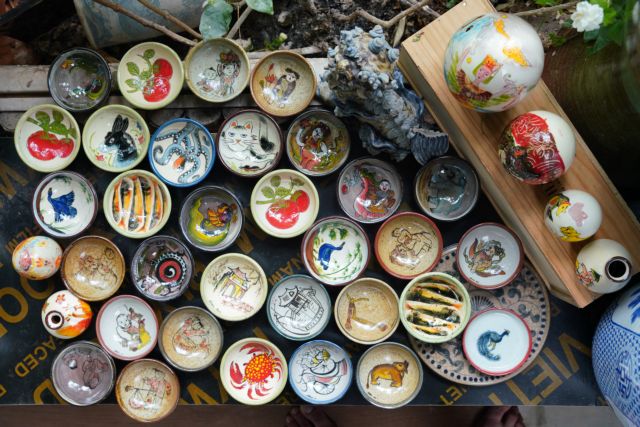 |
| Some ceramic pieces made by the learners. — Photo courtesy of Gốm Sen Pottery |
The diversity of the learners’ backgrounds makes teaching the classes challenging, requiring a tailored approach.
Trần Lưu, a Gốm Sen Pottery co-founder and a drawing teacher, explained that autistic learners need extra attention and familiarity to feel comfortable, making verbal rapport essential for engagement. For hearing-impaired learners, physical affection like hugs and handshakes can build trust, while their strong visual learning abilities allow them to grasp concepts quickly through demonstrations.
"Sometimes I use body language and written words to help hearing-impaired learners understand better," said Lưu.
Yvonne Adhiambo, a Kenyan English teacher at Gốm Sen Pottery, said she believed that every learner deserved comprehensive support, regardless of their academic performance. She emphasised that effective teaching required adapting to each learner's needs.
"There are students who are proficient in English but shy in expressing themselves. We should not just neglect them and say they are A-grade students who need support no more," said Adhiambo.
"I observe them and see how they work with what they have and their abilities, and then go from there. It's for them to teach me how to teach them."
To address learners' frustrations, Adhiambo's approach is simple yet effective: she advises them to take a break and practise the skills they are good at. Building confidence in their abilities helps them tackle the things that initially frustrate them.
Recognising that traditional classroom settings may be stressful for autistic learners, the teachers have organised outdoor classes and field trips to help them engage with the world. This approach has made a significant difference, making them more excited about learning and more open to interacting with others.
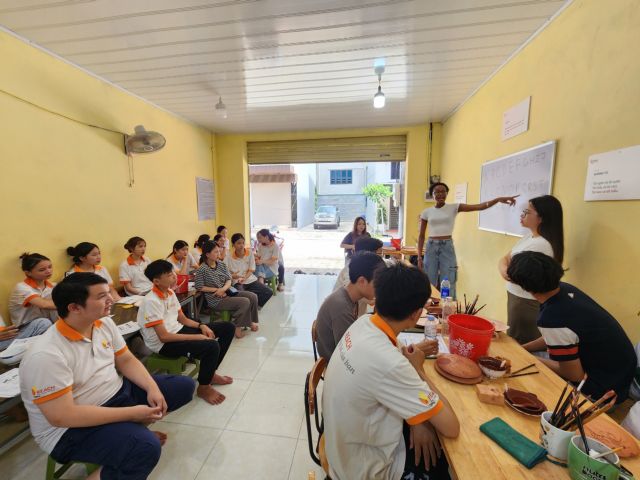 |
| Kenyan English teacher Yvonne Adhiambo demonstrates how to spell an English word to the learners. — VNS Photo Lê Việt Dũng |
Gốm Sen Pottery's commitment to supporting disadvantaged people has earned it a spot among the top 10 SIBs selected for the SIB Signature Programme, led by the Research Institute for Innovation and Development (IID). The programme is designed to help these businesses expand their market reach through intensive coaching and cross-selling.
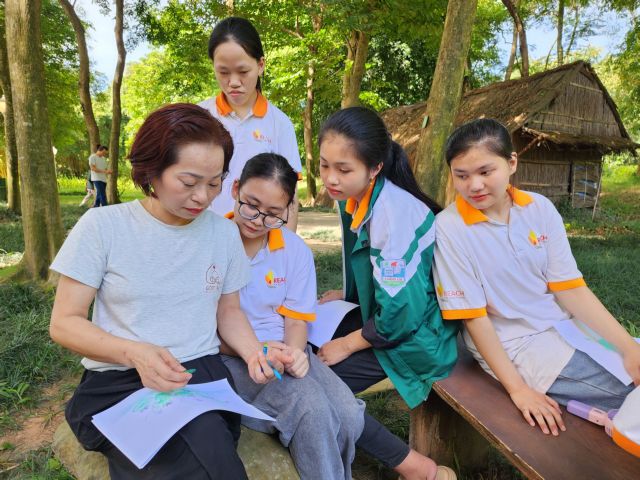 |
| Drawing teacher Trần Lưu demonstrates how to paint lotus flowers to four learners in an outdoor class.— VNS Photo Lê Việt Dũng |
"Gốm Sen Pottery has gone to great lengths to offer vocational training to disadvantaged people while keeping the traditional art of pottery alive. The social mission behind its work is evident," said Trương Thị Nam Thắng, lead researcher at IID.
Looking ahead, Tất Thắng plans to add new courses to the curriculum and build an environmentally friendly factory staffed primarily by graduated learners who love pottery. He aims to create more jobs for the disadvantaged and promote sustainable production practices within the industry.
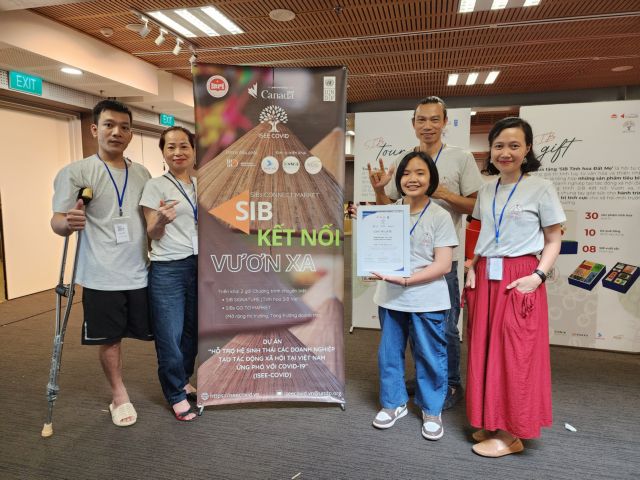 |
| Gốm Sen Pottery's team takes a group photo after it was certified as a SIB Signature participant on August 7. — VNS Photo Lê Việt Dũng |
"In the next several months, the curriculum will cover new courses such as self-defence and soft skills for social interaction," said Tất Thắng.
Maria Larmen, a Spanish tourist who visited Gốm Sen Pottery in August, was amazed by the beauty of the ceramic pieces made by the learners. She said she hoped the classes would become more widely known so that more disadvantaged people could receive the support they needed to break the cycle of poverty.
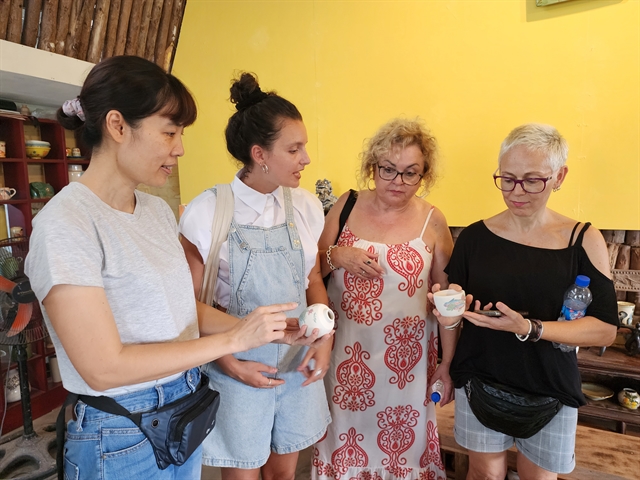 |
| Spanish tourist Maria Larmen (right) and her friends examine two jars made by disadvantaged people. — VNS Photo Lê Việt Dũng |
"There are few classes like this in Spain, but we are working to change the situation," said Larmen.
SIBs are businesses that adopt a triple bottom line, driving profit along with social and environmental impact. There are approximately 22,000 SIBs in Việt Nam, playing a crucial role in supporting vulnerable groups, mostly by creating jobs and delivering essential services. VNS